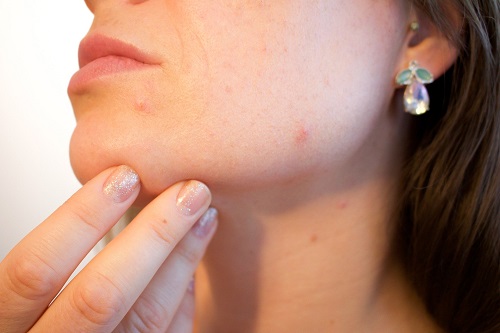For many patients, especially teenagers and young adults, acne may feel like the bane of their existence. If you choose to focus your medical career on dermatology, one of the highest-paying medical specialties, treating acne will be an important part of your future. It’s helpful for aspiring dermatologists to understand how and why acne occurs and how to treat it, as well as what else you should expect from this healthcare career.
Acne as a Medical Condition
IMAGE SOURCE: Pixabay, public domain
For patients dealing with persistent pimples, it’s not always easy to think of acne as a medical condition rather than a cosmetic problem. After all, aesthetics is often the biggest complaint patients have about their acne. However randomly it may seem that pimples pop up, they occur due to physiological causes like any other medical condition.
Although we tend to think of skin as being solid, human skin is actually full of tiny holes called pores or hair follicles. These pores house the sebaceous glands that naturally produce oil to moisturize and lubricate the skin and are thought to play a role in thermoregulation, the Journal of the Royal Society of Medicine reported.
However, these pores in the skin can become blocked or clogged. This results in the formation of a pimple, Healthline reported. Pimples can become inflamed and infected, particularly when bacteria find their way into the clogged pore and multiplies there. Most pimples fall under the category of comedones, which includes both whiteheads and blackheads. Although whiteheads and blackheads may look different, the difference is merely that whiteheads are closed and blackheads are open, exposed to oxygen that changes the color of the pimple’s head. Other types of acne include papules, pus-tipped pustules, pus-filled cystic lesions and large, solid nodules.
Acne sufferers are in good company. As many as 87 percent of teenagers develop acne at some point during adolescences, Healthline reported, and adult acne is a common complaint even beyond young adulthood, according to Harvard Medical School.
The Causes of Clogs That Form Pimples
Why do these pores get clogged in the first place? There are a few different things that can happen. Sometimes, the sebaceous glands simply produce too much oil. Factors like hormones and stress may cause excess oil production, particularly in teenagers and in adult women during pregnancy or menstruation. Certain medications, including steroids and some birth control medications, can also cause acne by increasing the amount of oil the body produces.
Other times, something blocks the hair follicles. This could be the patient’s own dead skin cells or a foreign substance like particles of makeup, skincare products, sunscreen or even bacteria. This can occur even if patients wash their face and other affected areas of skin frequently and thoroughly. Harsh chemical cleaners and overly forceful scrubbing can actually exacerbate a patient’s acne problem, according to the Mayo Clinic.
There are a lot of myths about what causes acne. A nutritious diet is always recommended for general physical health, but although diet plays a role in the amount of inflammation in the body, eating greasy foods does not appear to affect acne, the Mayo Clinic reported.
How Dermatologists Diagnose and Treat Acne
When acne is persistent enough to bring a patient into the dermatologist’s office, the consult will begin with a physical examination of the breakout. By looking closely at the patient’s skin, an experienced dermatologist can not only distinguish acne from other inflammatory skin conditions that can resemble acne but also determine the type and grade, or severity, of acne the patient is experiencing.
Treating acne usually begins with changes to the patient’s skincare routines. A dermatologist may recommend over-the-counter cleansers and moisturizers specially formulated for patients with that type of acne as well as prescription medications. These medications are usually topical, which means they are applied directly to the skin rather than being ingested by mouth, and can include ingredients that range from antibiotics to retinoids and salicylic acid, the American Academy of Dermatology Association reported. For more persistent or more severe cases of acne, a dermatologist may perform an in-office procedure such as drainage and extraction of a big cyst, chemical peels for blackheads and papules or laser therapies.
Topical medications are common, but dermatologists sometimes prescribe medications that affect the body on a larger scale, such as systemic antibiotics, hormonal birth control and, for severe acne, isotretinoin, better known by brand names like Accutane.
Beyond Treating Acne
Dermatologists see a lot of acne, but treating breakouts is far from their only responsibility. In fact, dermatologists treat upwards of 3,000 different health conditions, the American Academy of Dermatology Association reported. Identifying and treating – even curing – skin cancer is an important part of dermatology. So is treating inflammatory skin conditions that can be very uncomfortable and even painful. The field of dermatology is very broad. Some dermatologists focus on cosmetic dermatology, which focuses on improving aesthetics and appearance, while others practice strictly medical dermatology.
Many dermatologists’ practices offer some combination of medical and cosmetic services. In fact, dermatologists may be the first doctors to identify a problem that isn’t dermatologic in nature because both chronic systemic issues and acute infectious diseases may present with skin symptoms even before other symptoms of a disease become apparent.
Even acne can indicate a more widespread medical problem, such as an endocrine disorder like polycystic ovarian syndrome (PCOS), Harvard Medical School reported.
Additional Resources
Do Dermatologists Have a Specialty of Certain Bodies Parts and Areas?
What Procedures Would I Typically Go to a Dermatologist For?

